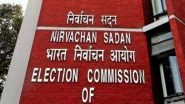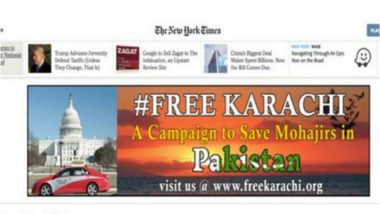Washington, March 6: The 'Free Karachi' campaign has launched a new drive to raise global awareness over the plight of ethnic Mohajirs in Pakistan. In this latest phase of the campaign, digital ads are appearing on the official website of a leading newspaper of the United States, New York Times, highlighting the Mohajir issue. On that note, New York Times is one of the leading newspapers in the USA, whose web-based viewership is worldwide. These digital ads urge US Congress to stop all kind of military and financial aid to Pakistan, as its military establishment allegedly continues to commit atrocities against Mohajirs and provide safe havens to extremist terror outfits in the country.
Nadeem Nusrat, the spokesperson for the Free Karachi campaign, told the media that the campaign in New York Times will run for at least two weeks and its ads will briefly explain what injustices the urban population in Sindh, Mohajirs in particular, has been facing. He said that Mohajirs are the most educated and secular group of people in Pakistan, who firmly believe in religious tolerance and coexistence. Pakistan's jihad-obsessed military establishment, however, is bent upon handing over these urban areas to its religious proxies such as the Taliban, JuD, Lashkar-e-Jhangvi, AWSJ, SSP, al-Qaeda, ISIS and other extremist outfits. These murderous outfits are openly operating in Karachi under the support of the country's intelligence agencies, whereas political workers belonging to secular political groups continue to disappear after being taken into unlawful custody by the non-local security forces. The military establishment has also been busy causing division among the Mohajir political leadership to weaken the unity of Mohajirs.
He added that due to complete ban on freedom of speech and ever-shrinking space for secular political groups in Karachi, raising a voice in democratic-loving countries is the only option left for Mohajirs. He said that raising global awareness about the dangerous practice of supporting terrorist outfits in Pakistan is vital for world peace, as such practices in Afghanistan have already led to dangerous terrorist incidents such as the 9/11 attacks. If left unchecked, this practice is likely to pose more major threats to the world peace.
Nusrat urged all those seeking to achieve long-term peace and stability in South Asia, Pakistan in particular, to raise their voice against injustices being committed against Karachi and other urban areas of Sindh. He said that Karachi is the world's second-most populace city in the world and its secular population could be an effective bulwark against the forces of extremism.
He also thanked all those people in and outside Pakistan who are extending their support to the Free Karachi campaign. He assured them that despite all seen and unseen challenges, the campaign would continue to raise the grievances of Sindh's urban population as well as Pakistan's other ethnic and religious minorities at every relevant platform in the world.
The 'Free Karachi' campaign had started in the US capital city Washington, DC, on January 15 this year on Martin Luther King Jr. Day. A large number of taxis, displaying 'Free Karachi from state atrocities of Pakistan' banners, had participated in the annual MLK Day parade.
For the unversed, Mohajirs are the descendants of those who had migrated to Pakistan from India's Muslim-minority provinces following the partition of the Indian subcontinent in 1947. Majority of these immigrants -now termed as Mohajirs, meaning immigrants- had settled in Sindh, the southern province of Pakistan.
These highly educated, secular and prosperous Mohajirs provided Pakistan with the skills and expertise the country needed to deal with the challenges the country was faced with in its first few years. The first prime minister of Pakistan, Liaquat Ali Khan, as well as the heads of most financial, administrative and educational institutions were Mohajirs. Liaquat Ali Khan, however, was assassinated in 1953 in the Pakistani city of Rawalpindi that also houses the headquarters, GHQ, of the Pakistan Army. Soon after the assassination of Khan, the Pakistani military took over and Mohajirs were systematically expelled from government jobs, army and educational institutions. Their privately-owned banks, other financial and educational institutions and factories were nationalised under the guise of socialism. A quota system was also imposed in Sindh Province which severely restricted opportunities for the urban population in employment and admissions in educational institutions.













 Quickly
Quickly


